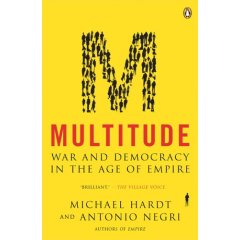Multitude
 Over the past three weeks I’ve been reading Hardt & Negri’s Multitude, which I learned of by way of Darren O’Donnell’s ‘darren-in-pakistan‘ blog (speciffically this posting) and I was actually inclined to read it. With regards to Empire I’ve had the same attitude that Noam Chomsky expressed about it here:
Over the past three weeks I’ve been reading Hardt & Negri’s Multitude, which I learned of by way of Darren O’Donnell’s ‘darren-in-pakistan‘ blog (speciffically this posting) and I was actually inclined to read it. With regards to Empire I’ve had the same attitude that Noam Chomsky expressed about it here:
QUESTION: It seems to me, with a certain degree of difference, that the concept of a virtual senate is similar to Negri’s and Hardt’s concept of Empire. [Michael Hardt, Antonio Negri, Empire (Harvard University Press, 2000)]
CHOMSKY: Empire, yes, but I have to say I found it hard to read. I understood only parts, and what I understood seemed to me pretty well known and expressible much more simply. However, maybe I missed something important.
QUESTION: Yes, and the book arrives to the same conclusion as yours but through a more complicated, less readable way…
CHOMSKY: If people get something out of it, it’s okay. What I understand seems to be pretty simple, and this is not a criticism. I don’t see any need to say in a complicated way what you can say in an easier way. You can make things look complicated, that’s part of the game that intellectuals play; things must look complicated. You might not be conscious about that, but it’s a way of gaining prestige, power and influence.
I’ve thus carried a prejudice toward Hardt & Negri’s work over the past few years, but something in the way Darren introduced it intrigued me; further web-reaserch led me to believe it was the type of thing I should read since it elaborated on what I’ve been personally calling the politics of variety.
I can’t say I totally agree with all of it – but I was open to its analysis. Getting through the first section was difficult – I don’t feel like I’m living in a Global State of War as much as I feel I’m living in a culture of propaganda continually devoted to telling me some asshole blew up some other assholes somewhere I have no plans of visiting.
My own understanding of American Empire is largely metaphorical – I agree with the premise of Empire but my feeling is that they administrations of the Western world’s nation-states don’t know what they’re doing in that regard – they are too incompetent. In other words, while academics can diagnose and Imperial condition, the reality is that the Western governments are in denial.
The ending, focusing on the democratic project of multitude, seems to elevate multitude to the sovereignty they wish to deconstruct. It also seeks to abolish all authoritarian structures with the aim of having an anarchist state ruled by the common interest and affective (‘niceness work’ one could call it) labour of the multitude – the network of individual interests.
What seems lacking is a recognition of the capitalist market as it exists as a form of multitude already self-organizing – but I know that’s such a faux pas to even mention it. As well, there seems to be a lack of acknowledgment of the substantial work that would need to be undertaken to ‘phase in’ the current mainstream mass of corporate workers and other people who don’t read, don’t think, and have no real capacity to function as they are within such a democratic society. In other words, how does one prevent the democratic multitude from being merely an autocracy of cliques? Such cliques would be identified as knowing who Hardt & Negri even are, as opposed to the mainstream, which is more preoccupied this weekend with Brittany Spears’ new haircut.